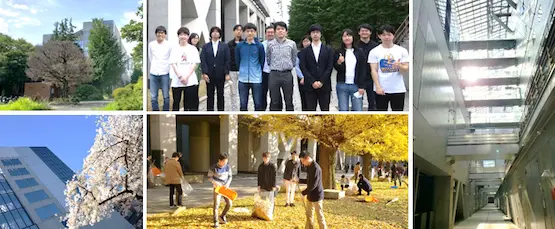
How to join NMDL
For Those Aiming for Graduate School, Doctorate, and Independence as Researchers
Our laboratory is recruiting graduate students and JSPS Research Fellows
◆ Research Objective: “Uncover the Structure-Function Correlation of Materials to Achieve Material Design”
If we can understand the “atomic and electronic structure,” which primarily determines the material properties, and further understand the “correlation between structure and function,” material design becomes possible.
To date, material development has required great efforts and costs. However, achieving a sustainable carbon-neutral society necessitates more accurate and rapid material development than ever before. Our laboratory aims to uncover the structure-function correlation of materials by combining first-principles calculations, atomic-level electron microscopy, spectroscopy, and machine learning to realize ‘material design.’
Specifically, we have studied advanced functional materials such as quantum materials, catalysts, energy materials, and ceramics. However, since our laboratory utilizes first-principles calculations, atomic-level measurements, and machine learning, we can research any material system. We conduct research that respects individual curiosity, including exploring new superconductors, ion conductors, designing materials like perovskite solar cell materials, polymers, biomaterials, atomic-level gas-liquid analysis, and challenges related to quantum technology.
◆ Guidance Policy: “Leaving a milestone in science = Publishing as the first author in science journals”
Our laboratory belongs to a research institute, and thus consists only of graduate students affiliated with the Department of Materials Science and Engineering in the Graduate School of Engineering, The University of Tokyo. As a result, students joining our lab often transfer from other universities or laboratories upon entering graduate school. After joining the lab, students first learn the basics of quantum chemistry and crystallography, and then acquire skills in programming, theoretical calculations, machine learning, and electron microscopy. Through our research, the member would further develop essential skills for researchers, such as presentations, academic writing, and discussion.
Moving to a new laboratory or university is challenging, for me, the present place is the 7th place for my research life. However, I well understand that there is much to gain by the challenge. All former students have presented at domestic and international conferences and published academic papers as the first author that stand as milestones in science. If significant results are achieved, students may be featured in press releases, appear in newspapers and online, win awards at conferences, or be invited to give lectures. The Mizoguchi Lab is a place where students take the lead, grow, and thrive.
Through a deep understanding of materials from the perspective of atoms and electrons, the Mizoguchi Lab aims to cultivate the next generation of leaders in materials science.
◆ We Are Recruiting Graduate Students & JSPS Research Fellows!
Students in our laboratory start new research themes after entering graduate school and have achieved numerous research results that have left their mark in the history of science, even within a limited period. There is no need to have prior knowledge of programming, theoretical calculations, or atomic-level measurements. Almost all students who have joined our laboratory started their research without such knowledge and acquired it as they progressed in their research. The important prerequisites are first, an interest in atoms and electrons, and second, the motivation to engage seriously with research during your time here and to grow as an individual.
By dedicating yourself earnestly to graduate-level research during your enrollment, you can acquire the following important abilities for your future life, regardless of your career path after graduation: -An attitude of engaging sincerely with research and challenges -Experience in overcoming difficulties, both large and small -The ability to deeply analyze obtained results and the balanced perspective to evaluate them appropriately -Skills in effective storytelling for conferences and papers
The Mizoguchi Laboratory widely welcomes students who love atoms and electrons and wish to achieve significant personal growth through research activities via PhD study.
We also welcome applications for JSPS Research Fellowships (PD, RPD). The JSPS PD and RPD fellowships offer valuable opportunities for independent and free research. Please utilize our lab as a place to acquire new knowledge and skills and grow into an independent researcher.
◆ Guidance for Doctoral Studies
Currently, we are accepting only international students who have a strong commitment to pursuing a doctoral degree.
◆ How to Join the Mizoguchi Lab
Our lab belongs to the Department of Materials Engineering, Graduate School of Engineering, The University of Tokyo. If you wish to join our lab as a graduate student, please take the entrance exam. For details, please refer to the entrance exam information page of the Department of Materials Engineering.